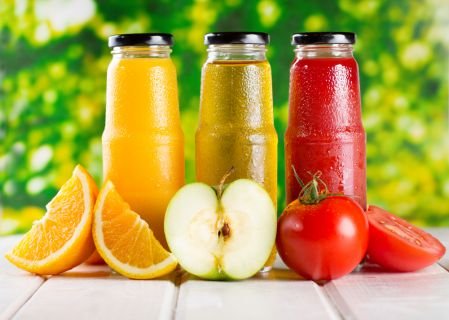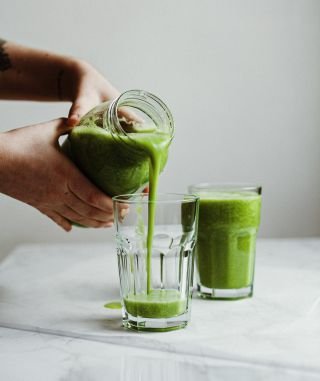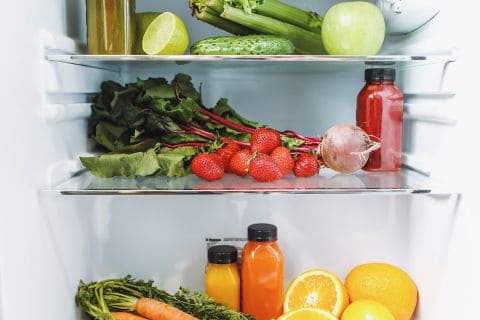Most people know that when it comes to packed juice vs fresh juice, fresh-squeezed juice tastes better, but did you know that the nutritional values of juices, like the vitamins, minerals, and antioxidants, actually decline over time? It’s true, because juicing removes most of the plant’s cell walls, and the plant’s natural defenses, which are meant to protect the cell, are also removed. As the natural cell defenses are broken down, the vitamins begin to deteriorate, not to mention that bacteria will grow in it just like any other fresh foods. It’s really important to drink your fresh juice right away because of this, but juicing daily can become an exhausting chore and is often a reason why people stop making it at home.
Here’s a great little tip for making life easier: make large batches of juice and store it for later. Not only will this cut down on prep time, but it’ll also reduce the messy cleanup afterward. But how long does fresh juice last when made at home? In theory, the best quality juice can last up to 5 days in the fridge but you could realistically expect it to go bad in 2-3 days. If you don’t refrigerate it, you should drink it up in 4 to 6 hours.
Table of Contents
- 1 How Long Does Homemade Juice Last in the Fridge?
- 2 What Makes Fresh Juice Go Bad?
- 3 How to Tell if Juice has Gone Bad
- 4 How Long Does Homemade Juice Last in a Mason Jar?
- 5 Can you Freeze Fresh Juice and How Long Does Homemade Juice Last in the Freezer?
- 6 How to Store Juice After Juicing and Make it Last Longer?
How Long Does Homemade Juice Last in the Fridge?
The answer depends on three factors: the type of juicer used, the type and quality of the ingredients, and how the juice is stored. You can add a day to the standard 2 days if you use a regular masticating juicer, add two days if you use a twin gear juicer, or subtract a day if you use a centrifugal one. We explain why masticating juicers are better for this than centrifugal juicers.
If you’re not going to drink it immediately, then it’s a good idea to stir in a good tablespoon or two of lemon juice to keep it from oxidizing and prevent the growth of bacteria, as not even refrigeration can prevent this from happening otherwise.
Want to know how long you can keep fresh-squeezed juice of specific fruits and vegetables when stored in a sealed container in the fridge? Here are the most common ones:
 Carrot juice: Up to 48 hours. The naturally high level of sugar creates a breeding ground for bacteria to grow.
Carrot juice: Up to 48 hours. The naturally high level of sugar creates a breeding ground for bacteria to grow.
Apple juice: 3 to 5 days.
Orange juice: 3 days if made with a citrus press or masticating juicer. 2 days at the most if made by a centrifugal juicer.
Beet juice: Up to 48 hours. Again, add a bit of citric acid by means of lemon or lime juice to counteract the effects of naturally present sugars.
Celery juice: Up to 24 hours.
Tomato juice: 2 to 3 days.
What Makes Fresh Juice Go Bad?
Fresh juice made at home is often high quality but it is highly perishable and will lose nutrients the longer it is kept out or in the fridge. There are two factors that contribute to the deterioration of juice.
Oxidation
Once a fruit or vegetable is extracted of its juice and it comes in contact with air, heat or light, the cells decompose naturally and juice starts to lose nutrients and turn sour. This process also makes juice slowly turn dark.
The method of juicing and storage can slow down oxidation and increase the shelf of the juice. If you want to try juicing but know that you’re unlikely to be able to do it every day, then the first thing you can do is buy a masticating juicer instead of a centrifugal one. We’ll explain why and give you tips for storage further down.
You should know that there’s another kind of appliance that does an even better job and preventing the oxidation of your drink. A vacuum blender can make smoothies with fiber intact and keeps the drink vibrant in color with less loss of nutrients and less foam by vacuuming out all the air from the blender jar before blending. This jar of smoothie can then be stored in the fridge without opening the vacuum sealed lid, thereby increasing the shelf life even more.
Bacteria
Bad bacteria inevitably grows on all food and drink and this is what causes juice to rot and smell bad after some time. You can delay bacterial growth by buying and juicing the freshest organic produce and washing it all thoroughly before juicing.
Once you have your juice, you should either drink it immediately or store it in the fridge, as the low temperatures slow bacterial growth as compared to when it’s left out on the kitchen counter or in the pantry.
How to Tell if Juice has Gone Bad
If you’ve kept juice out or in the fridge a little past recommended time, you can tell if the juice is spoiled by smelling it. If it smells sour, that’s the first indication that it’s unsafe to drink. Another telltale sign is if the juice has darkened or discolored. If you see anything resembling mold on the surface, then the juice is way past being safe to drink!
How Long Does Homemade Juice Last in a Mason Jar?
 Although you can use plastic juice storage containers to keep juice in the fridge, it’s not recommended because most juices are at least somewhat acidic, which causes even food-grade plastic to break down a little. This plastic can then leach through into the juice, which is harmful in the long term.
Although you can use plastic juice storage containers to keep juice in the fridge, it’s not recommended because most juices are at least somewhat acidic, which causes even food-grade plastic to break down a little. This plastic can then leach through into the juice, which is harmful in the long term.
Glass mason jars are ideal for storing homemade juice, as you can get them in almost any size so that you can store individual portions separately or the whole family’s quota in one jug. You should get mason jars with an air-tight seal so as to prevent oxidation as much as possible. Fill it up to the brim if possible so that there’s no layer of air trapped inside when you close the lid. This should give you around 2 days of safe storage for most juices from a masticating juicer. We like this 64 oz. mason jar pitcher for a family of 3-4 that drinks a glass of juice a day.
If you want an even longer home juicing storage time, Prepara Evak Fresh Saver Airless Canisters come in various sizes and feature an innovative design to keep foods and drinks fresh for longer. The lids feature a plunge-action vacuum seal where you push the lid down until it just reaches the top of the food or drink level. Just twist and the lid stays in position until you pull it out by the handle. The plunging action pushes air out from inside the canister and the seal prevents any from getting in. This vacuum seal ensures your juice will stay fresh longer.
If you’re traveling and want to keep your juice chilled so that it doesn’t spoil, then an insulated thermos flask will do nicely.
Can you Freeze Fresh Juice and How Long Does Homemade Juice Last in the Freezer?
Like most foods, juices can also be stored in the freezer. If you have a lot of produce that you can’t consume or give away before it does bad, then this is a good alternative. Freshly made juice can be stored in the freezer for up to 6 months without it going bad, but a better time frame is 3 months. This is because you will lose nutrients over time and when you defrost, so don’t expect to get the full benefits of juicing if you do.
There are two ways to freeze juice. One is by freezing in silicone ice cube trays. Once frozen you can remove the cubes and store them in freezer-safe Ziploc bags or airtight containers. This is a good option for individual family members to help themselves to as many cubes as they like to defrost in their glasses. Another method is to just pour individual serving portions into airtight canisters. However, with this method, make sure to leave a little bit of space below the lid before closing to allow the juice to expand while freezing. You’ll end up with cracked jars if you don’t!
How to Store Juice After Juicing and Make it Last Longer?
There are several things you can do to make fresh juice keep longer in the fridge.
- Get a masticating juicer: Masticating juicers use a slow-turning auger to extract juice instead of a high-speed cutting blade. The slow action produces little to no heat, which means that oxidation due to heat doesn’t occur and you can store the juice for a bit longer.
Centrifugal juicers will do the job faster but you should drink all the juice within 24 hours if stored in the fridge. To reduce the work needed to clean up after juicing, here are the easiest to clean juicers on the market.
An alternative to a centrifugal juicer is a vacuum blender. Although this doesn’t make juice but instead makes smoothies with the fiber intact, the inbuilt vacuum pump removes air from the blender jar before blending. Once you’re done, you can just store the whole blender jar in the fridge.
- Add some lemon or lime juice: Citric acid prevents oxidation, so if you’re juicing non-citric fruits or vegetables, adding a generous tablespoon or two of lemon or lime juice to each serving is a good idea. Or you can just juice a lemon along with the other ingredients.
- Use airtight containers: As explained above, to slow down oxidation during refrigerator storage, you need an airtight mason jar, or even better, a vacuum-sealed canister so that air doesn’t come in contact with the juice. Or, you might want to get a home vacuum sealer for liquids that comes with a jar attachment.
If you’re not going to vacuum the air out, then fill the jar up to the brim to prevent air from getting trapped inside. Use an insulated thermos mug for travel. Make sure whatever container you use is clean and dry first or you risk the juice being exposed to bad bacteria.
- Don’t keep opening and closing the jar: Every time you open the jar to pour out a glass of juice, you let in some air. That’s why storing individual servings in separate jars is a good idea, but if that takes up too much fridge space then try to get everyone to drink a glass at the same time.
References:
U.S. FDA
The Carrot Museum
Medical Medium
Our Everyday Life
Our Everyday Life



Thank you so much for the article it was quite informational.